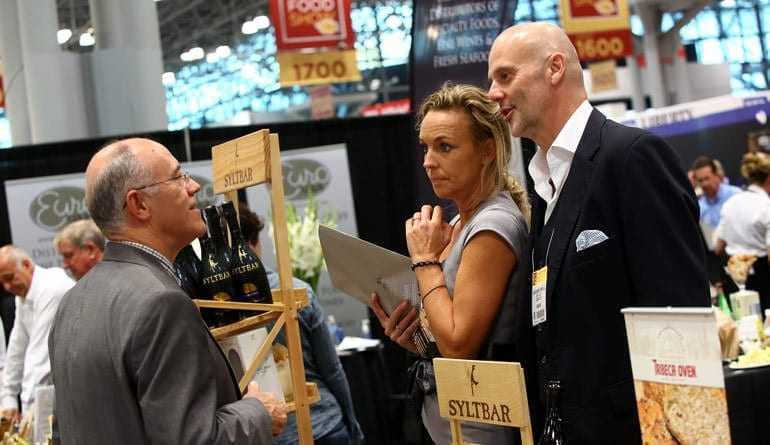
The olive oil world was well represented at the 60th annual Summer Fancy Food Show in New York City. Olive oil producers, exporters, retailers and promotion committees hailing from around the globe converged upon the Jacob K. Javits Convention Center in New York City from June 29th – July 1st at the massive event that featured 180,000 specialty food and beverages and draws over 24,000 visitors.
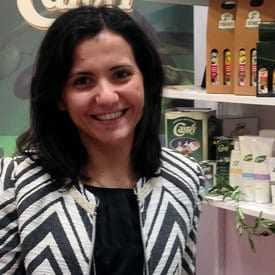
Among the international and domestic exhibitors from the olive oil industry, many had been attending this show for years, while others were exhibiting for the first time. However, the reasons behind their attendance at this major event were common to both groups: the American market is a critical one and the show provides opportunity for forging and solidifying connections.
Sizable American Market
Almost all of those in attendance expressed a keen awareness of unrealized growth opportunities in America, with a particular emphasis on improving awareness of olive oil. Antonella Caroli, sales & export Manager for Antica Masseria Caroli, a producer from Puglia, Italy, said, “It’s an important market. We want to improve Americans’ knowledge about olive oil. There is a lot of confusion and we want to explain how quality olive oils are different.”
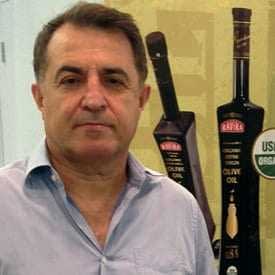
Other exhibitors were excited about connecting with U.S. consumers, buyers and category managers given the Americans’ interest in olive oil. Savas Ozaltun, general manager of Ravika, the fastest-growing olive oil brand in Turkey, knows that there is a great potential in the U.S. “We have been coming to the Fancy Food Show for over five years and we have found that Americans are always open to ‘new.’ They are thirsty to find out about new sources of quality oils, especially since the market is becoming saturated with oils from certain well-known [producing] countries.”
A Chance to Connect
Olive oil exhibitors all mentioned the word “connection” when prompted for their reasons for attending the Fancy Food Show.
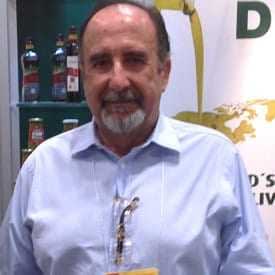
For those companies who have had booths at the show for years, the event provides an optimal setting to meet with customers and colleagues with whom they otherwise only communicate through technological means. Representatives from the United Olive Oil Import Corporation, a 100 year-old, family-run olive oil company out of Sicily, have been exhibiting at the show for over twenty years. “This is a chance for us to reconnect with people we do business with,” said Tommaso Asaro, who handles sales and marketing for the company. Antonio Arcis of Acorsa echoed those sentiments; “We have had a presence at this event for years. We meet with customers from across the country. People expect us to be here.”
For newcomers at the show, there was hope for building business and getting one’s name out there. Carla Reis-Alves is commercial director of Olivais do Sul, a small producer in Portugal. She described her brand as very young and characterized the people she had met thus far at the show as “very nice and very open,” which is ideal for a growing business like hers. Tony Fultz, who works in sales for Ohio-based Olivamed, said he and his colleague were looking to “get the brand out” and spread the word about their company.
The Fancy Food Show also featured educational seminars and awards recognizing excellence in foods and beverages.
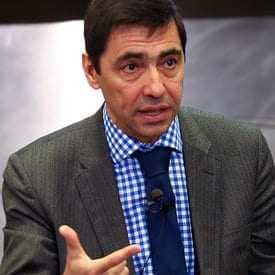
International Olive Council Executive Director Barjol Also On Hand
After speaking at a morning seminar titled “Understanding Olive Oil,” Jean-Louis Barjol, the executive director of the International Olive Council (IOC), was asked to comment on the recent downward trend in olive oil imports in the U.S. and other major markets. At this point, he said, the expectation is that imports in major markets will likely be down 7.5 percent, but it is still too early in the year to know for sure that this will be the case. He mentioned Spain having significantly higher production last year as one of the reasons why the import numbers are trending dismally.
On the Stance Against Flavored “Extra Virgin” Oils
Barjol was quick to point out that there is not an IOC campaign against flavored oils, but in fact, a reminder to member country governments to re-establish that “extra virgin” oils are, by definition, neither flavored nor infused. He said that it is up to the governments to refer producers to established labeling regulations. When asked specifically about what he thought the reaction would be to this, he responded that it will be a matter of individual countries’ politics that determines what the reaction of producers will be.
What Barjol Hoped to Accomplish with Morning Seminar
The IOC director said that the main objective of the seminar organized during the Fancy Food Show was to make the point that the IOC is a “dream team” — a neutral, institutional body that anyone in the olive oil world should want to work with in order to tap into their expertise. He wanted to reinforce the message that the Council is a transparent organization that makes all of its analyses and initiatives publicly available.
What’s Next After His Tenure Ends
When asked what his plans were after his three-year appointment ends this December, Barjol said there remained the possibility that he will be reappointed, so it was too early to say what his future plans are.






